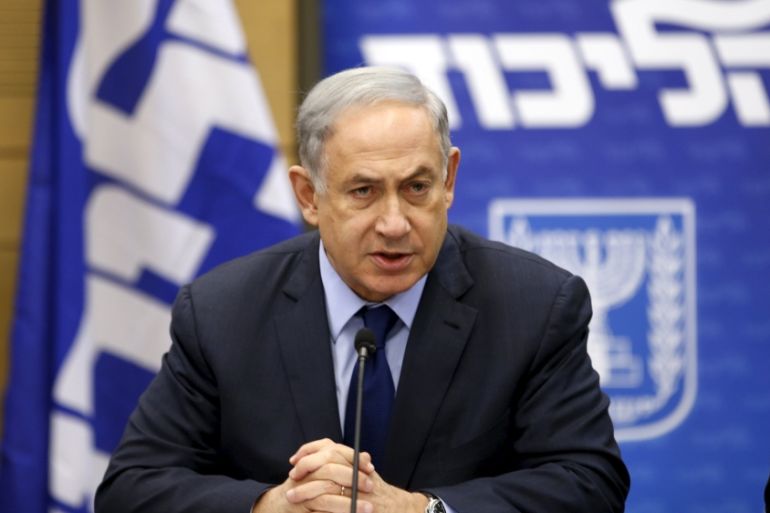BDS campaign ‘winning battle for hearts and minds’
The “Boycott, Divestment and Sanctions” campaign denies it has been defeated by Israel following claims by PM Netanyahu.

An international campaign to exert economic pressure on Israel to end its violation of Palestinian rights has not been defeated, one of its founders has said, despite claims made by Israeli Prime Minister Benjamin Netanyahu.
“We are winning the global battle for hearts and minds,” said Omar Barghouti, a Palestinian activist who co-founded the Boycott, Divestment and Sanctions (BDS) movement in 2005.
Keep reading
list of 4 itemsThe Take: After Iran struck Israel, how did Jordan and Lebanon react?
The world cannot turn its back on Sudan and its neighbours any longer
Russia-Ukraine war: List of key events, day 784
Since its launch, BDS has aspired to campaigns such as those seen during the anti-apartheid era, when people were called on to boycott goods from South Africa and divest from the country.
Netanyahu’s recent claims that BDS is in retreat are “laughable”, Barghouti told Al Jazeera.
“This [was] Netanyahu’s desperate attempt to deflect internal condemnation of his failure to stop BDS,” he added.
‘Hits on many fronts’
Addressing Israel’s Knesset State Control Committee meeting in July, Netanyahu said that BDS was “on the defensive”.
“They are taking hits on many fronts. We have beaten them”, Netanyahu said, according to media reports.
But several Israeli politicians at the meeting criticised Netanyahu’s administration for not doing more to defeat BDS.
OPINION: BDS is a war Israel can’t win
Participants also wanted to discuss two reports by Yosef Shapira, Israel’s state comptroller, which listed Israeli failures against BDS movement.
As the committee’s chairwoman Karin Elharra said: “Israel is facing a strong de-legitimisation campaign”.
‘Build bridges, not boycotts’
Launched over a decade ago as a global, nonviolent campaign seeking to exert pressure on Israel through boycotts on its goods, deterring investment and calling for sanctions, BDS has been accused by its critics of anti-Semitism.
Addressing the American Israeli Public Affairs Committee (AIPAC) in February, US presidential nominee Hillary Clinton described the BDS movement as “alarming”, particularly “at a time when anti-Semitism is on the rise”.
In May, Israel’s mission to the United Nations and the World Jewish Congress held a day-long conference at the UN’s headquarters in New York titled “Build Bridges, Not Boycotts” to denounce the efforts of BDS.
A month later, New York Governor Andrew Cuomo signed an executive order blacklisting organisations and businesses that supported BDS.
That order led to a backlash and protests by those who accused Cuomo of limiting basic rights.
BDS founder Barghouti says the movement has nothing to do with religion and “never targeted Jews, or Israelis as Jews”.
“This is a movement that calls for the equal rights for all people, irrespective of identity,” he said.
‘Fundamental rights’
Cuomo’s executive order blacklisting BDS supporters “violates fundamental constitutional rights”, said Rahul Saksena, a lawyer at Palestine Legal, which is dedicated to protecting the rights of people in the US who speak out for Palestinian freedom.
“The government cannot create blacklists based on First Amendment-protected speech, and the government may not condition the receipt of government benefits on the requirement that we forgo constitutional rights,” Saksena told Al Jazeera.
Despite the renewed focus on BDS by Israel, the movement has recently enjoyed an increase in support, particularly at the grassroots level, and among trade unions, academic associations, artists, church groups and some governments, Barghouti said.
READ MORE: The BDS question at US universities
Although the movement continues to gain attention, it is yet to have a significant economic effect on Israel, said Marwan Hanania, a scholar of Middle East history and politics.
BDS should focus strictly on Israeli activities inside the West Bank and Gaza, which could even draw support from left-wing Israelis, Hanania said.
“It is important for activists to broaden their horizons and attempt to be more inclusive,” he said
“Their message has to resonate with people who are not particularly knowledgeable or interested in the Palestinian cause on its own terms.”
It is a view shared by US academic and political theorist Noam Chomsky, who described BDS as “too broad”, in an interview with Al Jazeera in February.
“I support the aspects of BDS aimed at the occupied territories. Those are the ones that have been successful; they are principled and correct,” Chomsky said, explaining that he opposed actions being taken “against Israel itself”.
That would be like boycotting the US for the policies of its government.
“I do not suggest boycotting Harvard University and my own university, even though the United States is involved in horrific acts … You might as well boycott the United States,” Chomksy said.
Boycotting Israeli businesses and products outside the occupied territories would be ineffective, he added.
|
|